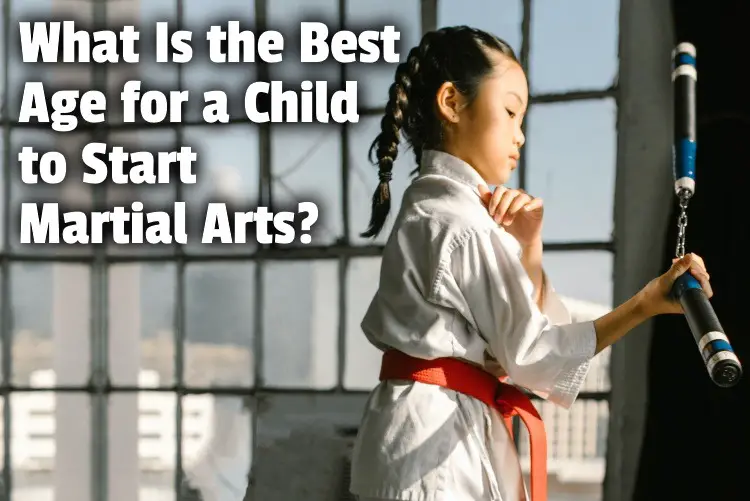Many martial arts schools take kids as young as age 3. But can they really learn the moves that young and are they likely to stick with it? And what is the best age for a child to start martial arts?
The best age for a child to start martial arts is ages 7-10. At this age, they are more likely to stick with it and have the maturity and focus to learn the techniques better.
Having said that, it is entirely dependent on the child.
Of course, no matter what the age, a good school will always make sure the curriculum is age-appropriate. The school I ran for many years didn’t allow contact sparring until age 7 and yellow belt.
But in this article, we’ll explore all the pros and cons of different ages, what they’ll learn, and how safe the classes are likely to be.
Let’s dive in.

Can a 2, 3, or 4-year-old do martial arts?
In most cases, age 2 is too young to start martial arts training. Ages 3 and 4 will be acceptable by many schools, but at that age, the curriculum will be focused mostly on fun and building focus, confidence, and resilience, more than teaching complex martial arts techniques.
At my old dojo, I was frequently asked by parents, “Is my 4-year-old ready to learn martial arts?” and my response is always, “It depends!”
Sure, I understand that parents want a quick answer so they can wrap up the talk, but the answer isn’t as simple as they might believe.
Your child will be setting the groundwork for a successful future in their chosen field, and their time will be spent learning the fundamentals.
Not all martial arts schools accept children at that age, though. As he or she starts school, he or she will learn the values of respect and gain confidence.
In a recent article of mine, I discussed how karate could help with anxiety. Anxiety, depression, and other associated disorders are common in this age, and karate can help deal with them.
Just click that link to read it on my site.
In 1984 a martial arts master agreed to teach karate to a bullied teenager. pic.twitter.com/uIjM9lTbWq
— Miles Commodore (@miles_commodore) November 29, 2021
Is a teenager too old to start martial arts?
A teenager is not too old to start martial arts, and children start and stop classes throughout an entire year, so there will always be an influx of new students in every age range.
In fact, most martial art experts like Bruce Lee, Jackie Chan, Cynthia Rothrock, Chuck Norris, and Michelle Yeoh all started their martial art journeys as teenagers.
Interesting, isn’t it?
Bruce Lee started his martial arts journey at the age of thirteen. Chuck Norris, the film hero, started his journey at the age of eighteen. Michelle Yeoh started at the age of 22, and we all know how popular she has become.
Starting later shouldn’t be an issue, but not venturing into martial arts at all can be a lifelong regret.
Teenage martial arts training has numerous advantages for pupils in middle and high school. Martial arts training improves physical health, teaches self-defense techniques, and instills traditional values such as honor, hard work, and respect. Martial arts, in a nutshell, is beneficial to both the body and the mind.
The TV show Cobra Kai and the Karate Kid films that came before have increased teen interest in martial arts.
Parents will be relieved to learn that, in addition to offering a terrific workout, martial arts instruction fosters character and community. During the adolescent years, habits are formed that will last a lifetime.
Enrolling teenagers in martial arts training is thus a wise parenting move that can have long-term benefits.
What age is too late to start martial arts?
In reality, no age is too late to start martial arts training, and there are many students in their 50s, 60s, and 70s. However, martial arts such as Jiu-Jitsu, Aikido, or Tai Chi are better suited for students over age 40.
Most people associate martial arts classes with children and teenagers.
There are, however, many classes for adults. Age is only a limitation for those who wish to feel old. Anyone who wishes to learn martial arts has broken through that limitation!
In fact, martial arts can help you improve and overcome some apparent limitations imposed by your age or physical condition.
But as I once heard Rener Gracie say, BJJ (Brazilian Jiu-Jitsu) is one of the few martial arts that older martial artists retire into. What he meant by that was that some martial arts (Karate, Muay Thai, or Taekwondo, for example) can be really hard on the joints.
And over decades of practice, it’s not uncommon for some martial artists to develop serious injuries or limitations because of long-term damage.
So many martial artists drop out of “hard” martial arts as they get older and focus more on BJJ or Aikido or Tai Chi. That’s because those arts tend to have a lot less potential damage to our bodies over time.
Some of the advantages that martial arts provide for children also apply to adults. They are as follows:
- Enhanced physical strength
- Improvements in mental capacity and awareness
- Self-defense abilities
- Self-assurance in threatening situations
- Defense against unforeseen risks
- Stress reduction
In short, adults want physical activity, cerebral stimulation, and self-esteem just as much as children do. And martial arts is an excellent approach to achieve all of these goals.
Martial arts are not only wonderful for developing skills, but they are also a great way to remain in shape. Martial arts classes are ideal if you’re tired of running or doing bicep curls at the gym. All you need is a good dose of motivation.
If you’ve never done martial arts before (or if you haven’t done it in a long time), trying new movements and challenging your body will have an even greater impact.
However, martial arts are more than just strength and weight loss.
Karate, for example, teaches balance and flexibility, which is very crucial for adults because our bodies lose flexibility as we get older!
I explored in a recent article of mine if Karate can make you taller. Just click the link. It takes you to my website.
You’re never too old to start.
Don’t put it off because the rewards outweigh the costs. Come on out and show the young ones how it’s done! Adults may learn and accomplish a lot in a short period of time, especially if they put their minds to it.
Fighting like a girl 💃🥇 The golden girls of 🇽🇰#MajlindaKelmendi #DistriaKrasniqi #NoraGjakova #Olympics #Judo pic.twitter.com/1HeLOJ7tfS
— Arbërie Nagavci (@arberienagavci) July 26, 2021
Which martial art is best for girls?
The best martial arts for girls are Judo or Brazilian Jiu-Jitsu, if both sport competition, self-defense, and spiritual philosophy are what’s important. But for pure self-defense, Krav Maga is the best option, although it’s not a true martial art.
At a time when women are more at risk of being openly groped, harassed, and molested, with the crowd gathering simply to see the heinous act, women must learn a martial art and learn to defend themselves.
While any martial art would function well on the street if you had extensive training in it, some martial arts may be more effective and more suited to you than others.
In a recent article on my website, I discussed the best martial arts for teenage girls. Girls need martial arts and the best time to teach them is at this young age.
Make sure to click the link to read the article here on my site.
Krav Maga differs from other martial arts in that it lacks a spiritual foundation and is solely intended to cause significant hurt to the opponent.
So for that reason, it’s really a self-defense system and not a martial art.
But as a Krav Maga practitioner, a woman can learn to use any part of her body as a weapon, particularly her knees and elbows, and to effectively neutralize both armed and unarmed violent situations.
Martial arts have become an important part of many people’s lives, among both adults and children. Parents enroll their kids at schools to improve their focus and discipline. Many adults have made the practice of martial arts a way of life. pic.twitter.com/WlE8ohol0U
— House of Martial Arts (@hma_pk) December 27, 2018
Why do parents put their kids in martial arts?
Parents put their children in martial arts for socialization, self-control, and increased confidence, or if they appear to need discipline. But special needs children can also thrive in martial arts.
Is discipline the biggest reason?
The discipline that exists in the dojo can be very strict, especially for young kids. That being said, discipline is a bigger factor in some schools more than in others. The dojo I helped run, for example, took a more mindful Montessori approach rather than a drill sergeant approach.
So look for a school that matches your mindset.
Martial arts can help children socialize with other children of their age. Sparring and training sessions require close contact and conversations, all of which lead to strong and lasting relationships.
Lastly, martial art builds one’s self-confidence. In learning to defend and attack, you create a stronger version of yourself which will stand you in good stead off the mat.
If you want to know how you can claim martial arts on your taxes, don’t fret, you’re not alone.
I discussed this in a recent article of mine. But is it possible? Is it legal? And what are the conditions under which you can do it?
Just click that link to read it on my site.
Conclusion
In the beginning, we discussed the possibilities of 2, 3, and 4-year-olds doing martial arts. We checked if a teenager is too old to learn martial arts. We also checked if a certain age was too old to do martial arts.
We then checked which martial arts is the best for girls, and then we rounded up why parents put their kids in martial arts.
Photo by RODNAE Productions from Pexels
